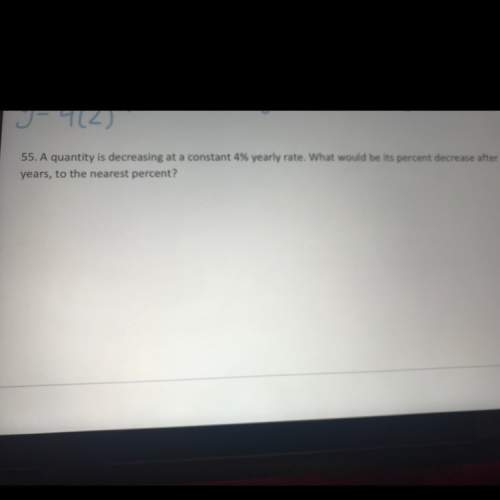
Mathematics, 27.11.2019 01:31 oliviastarkweather16
Suppose that surface σ is parameterized by r(u, v)=⟨ucos(3v),usin(3v),v⟩, 0≤u≤7 and 0≤v≤2π3 and f(x, y,z)=x2+y2+z2. set up the surface integral (you don't need to evaluate it). ∫σ∫f(x, y,z)ds=∫r∫f(x(u, v),y(u, v),z(u, v))∥∥∥∂r∂u×∂r∂v∥∥∥da = 2pi/3 ∫ 0 7 ∫ 0 u^2+v^2 ∥∥∥ ∥∥∥dudv

Answers: 1
Another question on Mathematics

Mathematics, 21.06.2019 14:30
Your friend swims on the school team. in his first four races, his times are 24.7, 23.5, 25.6, and 27.2 seconds. which time listed for his next race would make the range larger?
Answers: 1

Mathematics, 21.06.2019 18:00
Galen sold tickets of his church’s carnival for a total of $2,820. children’s tickets cost $3 each and adult tickets cost $5 each. the number of children’s tickets sold was 30 more than 3 times the number of adult tickets slod. how many children’s ticket and how many adult tickets did he sell?
Answers: 2

Mathematics, 21.06.2019 21:40
Which statement is true about a number and its additive inverse? a. their product is always one. b. their sum is always one. c. they are always reciprocals of each other. d. their sum is always zero.
Answers: 1

Mathematics, 21.06.2019 22:30
3. a sum of $2700 is to be given in the form of 63 prizes. if the prize is of either $100 or $25, find the number of prizes of each type.
Answers: 1
You know the right answer?
Suppose that surface σ is parameterized by r(u, v)=⟨ucos(3v),usin(3v),v⟩, 0≤u≤7 and 0≤v≤2π3 and f(x,...
Questions


English, 11.03.2022 04:20


Chemistry, 11.03.2022 04:20

Mathematics, 11.03.2022 04:20

Mathematics, 11.03.2022 04:20



Spanish, 11.03.2022 04:20

Mathematics, 11.03.2022 04:20


Mathematics, 11.03.2022 04:20




Mathematics, 11.03.2022 04:20


Chemistry, 11.03.2022 04:30


 is parameterized by
is parameterized by
 and
and  , and a normal vector to this surface is
, and a normal vector to this surface is

 is
is



